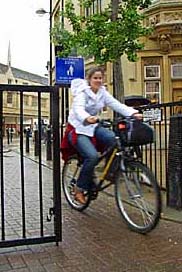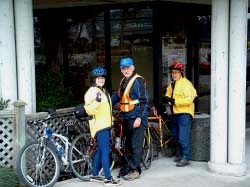Cycling Concerns..and Cycling Benefits
The following is excerpted from a letter I wrote to the Nanaimo News Bulletin, published in February, 2007.
Most people are lulled into a false sense of safety when they get into a motor vehicle. We think that the steel around us will make us safer than being a “vulnerable cyclist.”

The fact is that such perceptions are untrue. While it is true that a car weighs a lot more than a bicycle, and surrounds the occupants, they are not safer.
Take, for example, the accident I suffered in 2001 when a driver turned left across my path. I was able to take evasive action and came to a stop in a fraction of the distance a car would have taken. Had I been driving a car instead of my bicycle I would have likely killed the passenger in the offending vehicle.
Cars are unable to manoeuvre to the same degree, take up a lot more space and usually travel at greater speeds, so haplessly end up being death traps for their occupants when there is a collision.
Statistically, the rates of death and injury from accidents are nearly the same for occupants of cars as they are for cyclists, even considering the number of very foolish cyclists using our roads.

In addition, the lungs of cyclists’ do not collect the toxic remains of vehicle exhaust nearly to the degree as do the occupants of those nearby vehicles. So, too, cyclists get a great workout, which improves their quality of life, ability to focus at work, and adds to the length of their lives. Additionally, the exposure to sunlight, even in the winter, helps to keep our vitamin D supply up, reducing the incidence of disease.
Freeing up the money wasted on single occupancy vehicles, cyclists can spend more on improving their health, are more likely to eat healthier foods, and do not contribute as much to air pollution -which alone kills thousands of Canadians every year.
Despite the perceptions, it is actually better for one’s health to cycle than it is to be in a motor vehicle.
If you stopped using one car you would save yourself thousands of dollars each year, feel better, and lower your emissions by a few tons a year. Wouldn’t this be better than feeling guilty and being broke?
Back to Transportation page